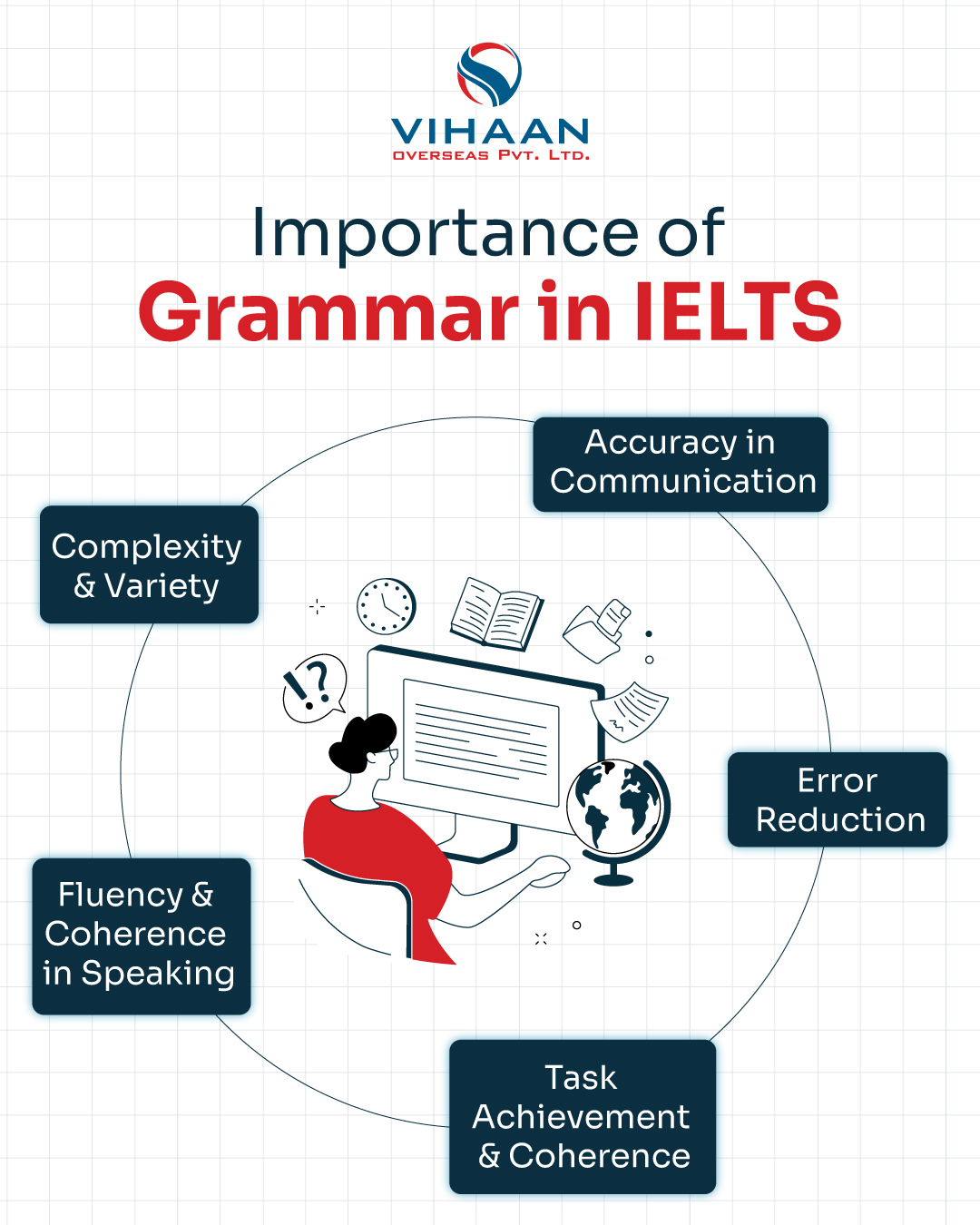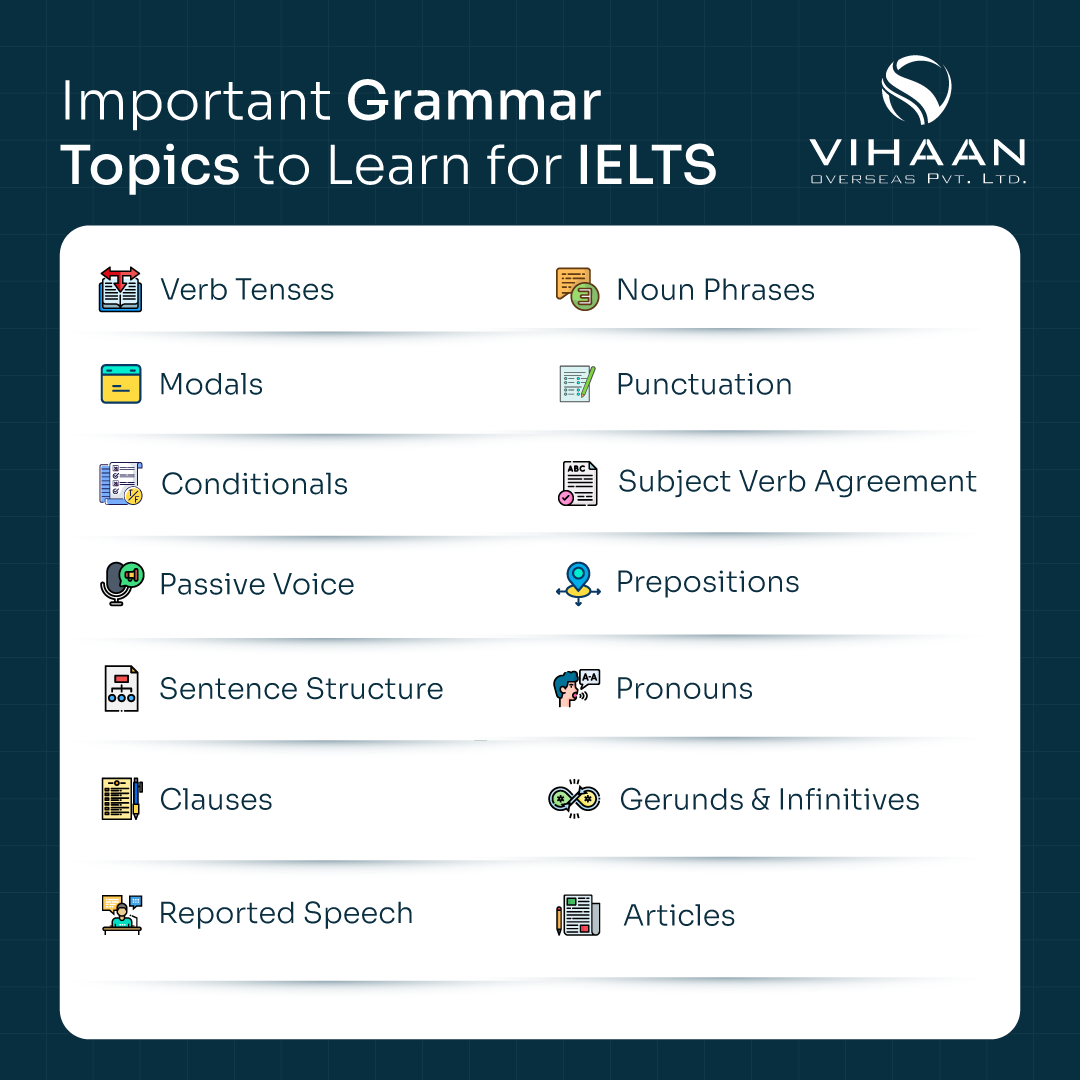
USA Student Visa 2025 Guide for Indian Students: Requirements, Types, Process, and Costs
August 29, 2024
Spring Intake in USA: How to Prepare and Apply for Top Universities
October 18, 2024Appearing for IELTS test again and again, but still can’t get your desired bands?
If yes, you must work on your grammar!
IELTS exam is one best way assess your English proficiency as it focuses on all 4 aspects – listening, reading, speaking, and writing. A strong grasp of grammar is crucial for achieving a high IELTS score, as it directly impacts your language accuracy through its speaking and writing modules.
In this blog, you will explore effective tips that can help you enhance your grammar skills and boost your chance to succeed in IELTS.
Table of content
IELTS Overview
Shortened for International English Language Testing System, IELTS is a globally recognized English language proficiency test that assesses the English language skills of non-native English speakers. IELTS test is widely accepted by universities, employers, and immigration authorities around the world.
Types of IELTS Exam
There are two main types of IELTS:
1. Academic IELTS: This test is specifically designed for individuals seeking admission to abroad universities or further education programs.
2. General Training IELTS: This test is suitable for those planning to migrate to an English-speaking country, or those seeking employment in an English-speaking environment.
IELTS Exam Modules
The IELTS exam consists of main four sections:
-
Listening: It tests your ability to understand spoken English in various accents and contexts.
-
Reading: Assesses your ability to read and understand English texts of different types and complexities.
-
Writing: Evaluates your ability to write clear, coherent, and grammatically correct English essays.
-
Speaking: Measures your ability to communicate effectively in spoken English through a face-to-face interview.
IELTS Scoring
The IELTS score is measured on a scale of 0-9, with 0 being the lowest and 9 being the highest. Each section is scored individually, and the overall band score is the average of these individual scores.
Why You Need to Take IELTS Exam?
-
University Admission: Many universities require IELTS scores to ensure that applicants have the necessary English language skills for academic success.
-
Scholarships: Some scholarship programs use IELTS scores to assess applicants' language proficiency.
-
Visa Applications: IELTS is often required for visa applications to English-speaking countries, both for study and migration purposes.
-
Permanent Residency: In some countries, achieving a certain IELTS score is necessary for permanent residency applications.
-
Employment: Certain jobs, especially in English-speaking countries, may require proof of English proficiency through IELTS scores.
-
Professional Licensing: Professions such as healthcare and teaching may require IELTS scores for licensing or registration.
-
Language Proficiency Assessment: Taking IELTS can help you understand your English language skills and identify areas for improvement.
-
Global Mobility: If you plan to study or work abroad in an English-speaking country, IELTS can be a key requirement.
Importance of Grammar in IELTS

Accuracy in Communication: Correct grammar ensures that your ideas are communicated clearly and accurately. In both the Writing and Speaking sections, grammatical errors can obscure your meaning, making it harder for the examiner to understand your points.
Task Achievement and Coherence: In the Writing section, proper grammar contributes to task achievement and coherence. Using correct sentence structures helps you to effectively organize your arguments and present them logically, which is essential for achieving a higher band score.
Fluency and Coherence in Speaking: During the Speaking test, grammatical accuracy impacts your fluency and coherence. Errors in tense, subject-verb agreement, or sentence structure can disrupt the flow of your speech and affect how well you convey your message.
Complexity and Variety: Demonstrating a range of grammatical structures can showcase your proficiency and contribute to a higher score. Using varied and complex sentences effectively can reflect your advanced understanding of English.
Error Reduction: A strong grasp of grammar helps minimize mistakes, which is crucial since frequent grammatical errors can lower your score. Being able to use correct grammar consistently is key to achieving a higher band score.
Important Grammar Topics to Learn for IELTS

- Verb Tenses:
Understand the different tenses and when to use them to express actions in the past, present, and future.
- Modals:
Learn how to use modals like "can," "could," "must," and "should" to express possibility, necessity, permission, and other meanings.
- Conditionals:
Master the different types of conditionals (zero, first, second, third) to express various hypothetical situations and their outcomes.
- Articles:
Using "a," "an," and "the" correctly helps specify nouns and convey whether you are referring to something specific or general.
- Noun Phrases:
Understand how to combine nouns with adjectives, articles, and other modifiers to create complex noun phrases.
- Pronouns:
Learn to use personal, demonstrative, relative, and indefinite pronouns correctly.
- Prepositions:
Master the use of prepositions to indicate relationships between nouns, verbs, and other words.
- Sentence Structure:
Learn how to construct clear and grammatically correct sentences, using various sentence structures.
- Punctuation:
Use punctuation marks correctly so that it clarifies the meaning and structure of your writing.
- Clauses:
Understand the different types of clauses (main, subordinate, relative, noun, adverbial) and how to use them effectively.
- Gerunds and Infinitives:
Learn the differences between gerunds (-ing forms) and infinitives (to + verb) and when to use each.
- Reported Speech:
Understand how to change direct speech into indirect speech, including tense shifts, pronoun changes, and time references.
- Passive Voice:
Understand when to use passive voice to emphasize the action rather than the doer.
- Subject Verb Agreement:
Ensuring that subjects and verbs agree in number (singular or plural) is fundamental for grammatical accuracy and coherence in writing and speaking.
Grammar for IELTS Speaking
The IELTS Speaking section lasts approximately 11 to 14 minutes and evaluates a candidate's speaking ability. It covers a range of topics, including general subjects, personal experiences, and specific issues, with some questions potentially being quite abstract. While some influence from your native language is acceptable, maintaining impeccable grammar is crucial. The examiner also assesses your confidence, pronunciation, and overall fluency in speech.
Grammar for IELTS Writing
The IELTS Writing section involves two tasks that must be completed within 60 minutes. In Task 1, candidates are required to interpret and describe data presented in diagrams or graphs and draw a conclusion based on their analysis. Task 2 involves crafting a well-structured essay with impeccable grammar, as it is the most critical component of the IELTS Writing section and assesses a candidate’s writing proficiency.
Grammar for IELTS Reading
The Reading section consists of three components designed to assess a candidate’s reading abilities. Test takers are given 60 minutes to answer 40 questions on various topics. This part of the test involves skimming the text, grasping the main ideas, and understanding the logical arguments presented. Although it may appear straightforward, it can be quite challenging, as candidates need to evaluate the writer's viewpoint and the text's purpose.
Grammar Tips to Follow for IELTS Success
1. Practice Regularly:
Consistent practice is essential for improving your grammar skills. Make grammar a daily habit and engage in exercises, writing tasks, and speaking activities.
2. Follow Grammar Rules:
Understanding and applying grammar rules correctly is crucial for accurate writing and speaking. Familiarize yourself with fundamental grammar concepts and ensure consistent application of these rules.
3. Master Sentence Structure:
Use a variety of sentence structures to make your writing and speaking more engaging and effective. Experiment with simple, compound, and complex sentences to avoid repetition and express your ideas more clearly.
4. Analyze Your Performance:
Identify your strengths and weaknesses to focus your practice and improvement efforts. Review your practice materials, seek feedback from teachers or native English speakers, and analyze your mock test results to pinpoint areas where you need to concentrate.
5. Use Reliable Resources:
Consult reputable grammar textbooks, online resources, and teachers for guidance and practice materials. Refer to reliable sources for explanations, exercises, and feedback.
6. Proofreading:
Check your writing for grammar errors and ensure that your ideas are expressed clearly and accurately. Have someone else review your work for additional insights and to catch any mistakes you may have missed.
7. Take Mock Tests:
Practice under exam conditions to familiarize yourself with the IELTS format and identify areas for improvement. Simulate the exam environment and time yourself to assess your performance and identify areas where you need to focus.
8. Expand Your Vocabulary:
A strong vocabulary is essential for expressing your ideas clearly and effectively. Learn new words and phrases regularly and understand how to use them correctly in different contexts.
9. Avoid Dangling Modifiers:
Ensure that modifiers are placed correctly to avoid confusion and maintain clarity. Make sure that modifiers clearly modify the intended subject and avoid ambiguous phrases.
10. Engage in English:
Read, listen, and speak regularly in English. Watch English movies, listen to English music, and read English books to expose yourself to the language in various contexts. Practice speaking English with native speakers or other learners to improve your fluency and accuracy.
Join the Best IELTS Coaching Class in Gandhinagar
IELTS is one of the best ways to improve your English language skills which also open the doors to
study abroad for you. Preparing for IELTS without any guidance can feel daunting and confusing.
Vihaan Overseas offers the top IELTS coaching class in Gandhinagar, where our certified faculties assist you in each module with in-depth information and help you to be fluent in English. If you're someone looking to improve your grammar skills or want to study abroad, IELTS is the best option, and taking coaching from Vihaan Overseas is another best.

















